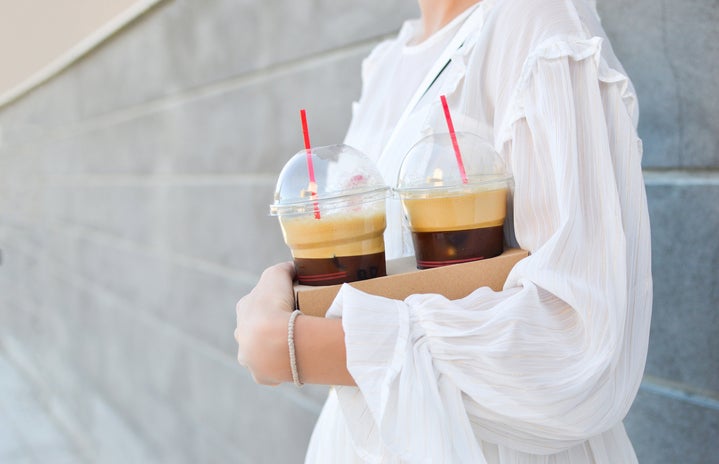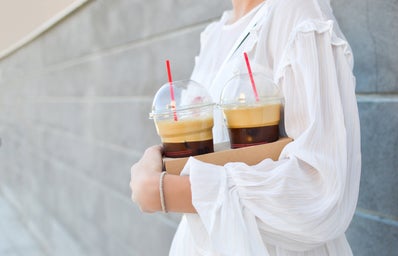If any one of us has an addiction to caffeine, it’s yours truly. Go through my bank statement, and you’ll find a continuous myriad of charges from Dunkin’, Starbucks, and my local favorite, Pavement Coffeehouse. When I roll over in the morning to reluctantly turn off my alarm, one of my first thoughts is when will I be able to get my coffee?
I didn’t realize how essential a nice iced coffee had become to my routine until I started working a 9-to-5 internship this past summer. They had iced coffee available every day, and often I’d find myself downing two (or on the rough days, three) cups. On weekends, when I’d wake up later and go without, I’d notice the withdrawal symptoms. My head would pound, I could barely stay awake or focus, and I never felt like fully functioning until I took that first sip.
The U.S. Food & Drug Administration defines caffeine as a drug, and while you may be shaking your head in disbelief, it’s one of the most widely abused psychoactive substances in the world. If you’re like me, you rely on your coffee to get you through tired mornings, but the first hour or so of an energy boost can lead to symptoms later in the day such as dehydration, anxiety, irritability, faster breathing, increased heartrate, and stomach pains. None of those sound like a good time to me, no matter how happy I am when I order my Starbucks venti iced caramel macchiato, soy milk please.
As college students who are constantly on-the-go, you probably still crave a morning boost. So I tried out a few coffee alternatives that have significantly less caffeine and assessed my energy levels after consumption, and I’ve examined how I’ve felt on days when I go without. Looking to lessen your caffeine dependency? Read on to figure out what option is best for you!
- Try out kombucha
-
Semi-unpopular opinion: I love kombucha. While this fermented tea is frequently of the “you either love it or hate it” persuasion—even inspiring a widespread meme—whenever I drink kombucha, I instantly feel so much better. According to Good Housekeeping, the probiotic drink provides higher levels of energy and detoxes your body, among other benefits. My favorite brand of kombucha is GT Dave’s.
Whenever I pick up a bottle at the supermarket, I never finish the whole bottle in one go. This makes it incredibly easy for me to save, especially if I need a late-night pick-me-up when I’m cramming for a test or speed-writing an essay. Like I said before, the natural ingredients such as organic black and green tea and kiwi juice mean there’s no unwanted side effects, unlike when you chug a large iced coffee and then wonder why you’re twitching an hour later. Kombucha is a better alternative to your daily coffee order, but just know that it’s an acquired taste!
- Treat yourself to a matcha green tea latte
-
I’m kind of cheating a bit adding this one in, because some matcha lattes are not the healthiest option (I’m looking at your sugary good latte, Starbucks). But a matcha green tea latte still provides a cleaner boost than regular coffee. Some matcha lattes do have a good amount of caffeine in them, but the energy they provide isn’t the shakes and the horrible aftereffects of a few cups of coffee. Instead, matcha ensures that its activating effects are sustained and long-lasting.
I can attest to this. On days when I’m looking to go without coffee but still want to feel good, I order a matcha green tea latte and feel energized afterward. I may be biased because drinking anything green makes me feel exponentially healthier, but when I’m working in the student union until the wee hours, I feel a bit better with this beverage by my side. Additionally, they’re really easy to make in your apartment!
- Drink more tea in general
-
Tea feels like something you’re meant to drink before bed, and imagining curling up with a warm cup of earl grey during the winter months definitely does not motivate me to give up coffee. However, one of my best friends is an advocate for drinking tea to help her focus because there are small traces of caffeine, but not enough to experience all the dizzying side effects.
There are a few teas that actually provide similar energy to coffee. If you know you’re going to need to focus on a task at hand, Cup and Leaf recommends trying out peppermint tea and ginger tea, among others. These teas are also effective as they reportedly sharpen your memory, lead to a happier mood, and decrease tension. The fresh flavor will immediately spark your senses, perking you up so you can complete that discussion post without nodding off in the middle.
- Make yourself a breakfast smoothie
-
Smoothies and juices such as brand names Naked and Odwalla get a bad reputation, mainly because of all the added sugars they’re typically made with. While I’m not recommending you stop at your local Jamba Juice every day, making a smoothie at home can be an incredible alternative to your vanilla latte.
With natural ingredients like fresh fruits, milk alternatives, and acai, you can have a truly energizing breakfast. Instagram personality @purelykaylie created the recipe above that’ll have you feeling prepared to take on the world. Not only will you be feeling satisfied, but you can definitely skip the large coffee and everything bagel that you’ve been eyeing for the umpteenth time.
- The ultimate sacrifice: going completely decaf
-
Maybe one day I’ll be able to completely wean myself off caffeine, but I don’t see that day coming soon (to be fair, I am a college senior). However, if you’re feeling brave, going without is a great step. While the first few mornings may be terrible, once you get through the day, you’ll realize you really didn’t need your coffee order. I feel much more refreshed when I focus on drinking enough water throughout the day instead of getting something caffeinated at my local coffee shop.
Above all, ensure that your health is your priority. These are just a few of the options I’ve tried to avoid caffeine without the help of my favorite vanilla latte. You can also try taking energy supplements and vitamins. If your tiredness is truly a problem, consult your on-campus health resources and healthcare provider, as there may be something more serious going on.


